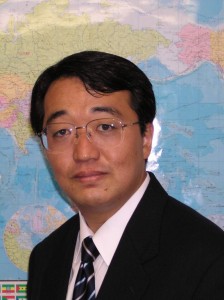緊張と統合:内村鑑三におけるキリスト教と日本の精神
このシリーズでは、私が1994年に執筆した統一神学大学院(Unification Theological Seminary)の神学課程修士論文(Divinity Thesis)を日英二か国語で掲載している。
3.無教会運動における司牧の概念の続き
1884年に彼はアメリカに渡り、アメスト・カレッジに学んだ。彼の精神的発達にとって、このアメリカ滞在は決定的な重要性を持つ。アメストにいる間、彼はその大学の総長であり、コロネル・クラークの元学友でもあるジュリアス・H・シーリーのピューリタン的な人格に強く感銘を受けた。しかし全体としては、内村は常に自分のアメリカ訪問を、大いなる精神的失望の期間として思い起こすのである。彼がアメリカに対して抱いていた無邪気な「聖地」の夢は、彼がアメリカの人種差別、世俗主義、教派主義を見た時に、もろくも崩れさったのである。
余の知識の範囲と限界は限定せらるべきであった、いまや余に信受を迫る無数の意見に対して余自身を武装するためであったのである。アメリカは教派の国であり、各自は他を犠牲にしてその数を増大しようと試みる。すでにユニテリアン主義、スウェーデンボルグ主義、クエーカー主義、等々のようなかかる見なれない諸主義が、他の余が熟知しているものは言うにおよばす、余に対して試みられつつあった。憐れな異教徒回心者はどれを自分自身のものとすべきかに途方にくれる、そこで余はそれらの何一つをも受け入れまいと決心した。いったいいかなる朽つべき人間が夫々其の長所と短所のある幾十の教派の中よりして、『正しい選択』をすることができるか。(岩波、前掲書、p.142)
内村は、福音と初代教会のもつ根源的な単純さに立ち返ることを欲したのである。彼は16世紀の宗教改革を、教会を制度主義から解放しようとした試みとして評価するが、ルターは聖礼典と共に教会制度を持続させたので、その究極的な目的を実現することが出来なかったとする。内村の弟子の一人である矢内原忠雄は、内村をエレミヤ、イエス、パウロ、ルターに並ぶ改革者であると位置づけているが、内村はルターにおける教会の観念を越えた所に至ったと彼は信じている。彼は、ルターはキリスト教を組織化された教会の権威から解放することにおいて不徹底であった、と批判するのである。矢内原は無教会こそプロテスタンティズムを越えてそれを徹底的に進歩させたものであり、真実にして最後の形のキリスト教であると主張する。
内村は、教会は現在第二の宗教改革を大いに必要としていると信じていた。しかし彼は、西洋文明にはそれを達成することが精神的に不可能であると確信していた。なぜならば、西洋文化はギリシヤ人の知性(Greek intellectualism)とローマ人の法至上主義(Roman legalism)に由来していたので、西欧では常に精神的なものが解体するのを防ぐために、これを合理化し、制度化する傾向があったからである。西洋キリスト教の歴史は、教会の制度主義に対して挑戦するために出現した多くのセクトの例に満ちているが、それらはしばしばその母体から引き継いだ教派主義的な要素を、そのイデオロギーの中にはらんでいたのである。これらセクトの中に残存してる諸要素は、信仰、道徳、祭儀という正統主義に見られる最小限度の核となるような概念を要請し、従って適切な監督機能の設定を要請するために、結局はそのセクトがもともと避けようとしていた組織化そのものへと帰って行く結果となるのである。
III. Concept of Ministry in Mukyokai Movement (Cont.)
In 1884, he went to the United States and studied at Amherst College. His stay in the United States was of critical importance for his spiritual development. While at Amherst, he had been strongly impressed by the puritan personality of Julius H. Seeley, president of the college and a former classmate of Colonel Clark.
On the whole, however, Uchimura would always recall his visit to the United States as a period of great spiritual disappointment. His naive dream of America as a “holy land” was broken when he saw the racism, secularism, and sectarianism in United States.
The extent and limit of my knowledge was to be defined that I might armor myself against the multitudinous opinions which were now forced upon me for acceptance. America is a land of sects, where each tries to augment its numbers at the expense of others. Already such strange “isms” as Unitarianism, Swedenborgianism, Quakerism, etc., to say nothing of others with which I was already familiar, were being tried upon me. The poor heathen-convert is at a loss which to make his own; so, I made up my mind to accept none of them. What mortals under heaven can make a “right-choice” out of dozens and scores of denominations, each having its own merits and demerits?(7)
Uchimura wanted to return to the primitive simplicity of the Gospel and the early church. He evaluated the sixteenth century Reformation as an attempt of freeing church from institutionalism, but it could not realize its ultimate purpose because Luther maintained the church system with its sacraments. Tadao Yanaihara, one of the disciples of Uchimura, describes Uchimura as a reformer alongside Jeremiah, Jesus, Paul, and Luther; however, he believes Uchimura to have gone beyond Luther’s idea of the church. He criticizes Luther for his incompleteness in liberating Christianity from the authority of the organized church. Yanaihara claims Mukyokai to be a thoroughgoing advance beyond Protestantism, and true and final form of Christianity.(8)
Uchimura believed that the modern churches badly need a second reformation. However, he was convinced that western civilization was spiritually incapable of accomplishing it, for, since western culture was derived from Greek intellectualism and Roman legalism, the West always tended to rationalize and institutionalize the spiritual in order to prevent its dissolution. The history of Western Christianity is a catalogue of sects which emerged to challenge the institutionalism of the churches, but which often contained in their ideologies denominational elements derived from the parent bodies. These residual elements called for the definition of a minimum core of orthodoxy in belief, morality, and liturgy, and therefore, for the establishment of appropriate supervisory mechanisms which in turn resulted in the very institutionalization the sects had originally fled.(9)
(7)op cit, Uchimura, How I became a Christian,”.p.135.
(8)Tadao Yanaihara, Mukyokaishugi Kirisutokyo Ron [Theory of non-Church Christianity]. (Tokyo: Iwanami Shoten, 1982), p.161-196.
(9)Caldarola, p.145.
